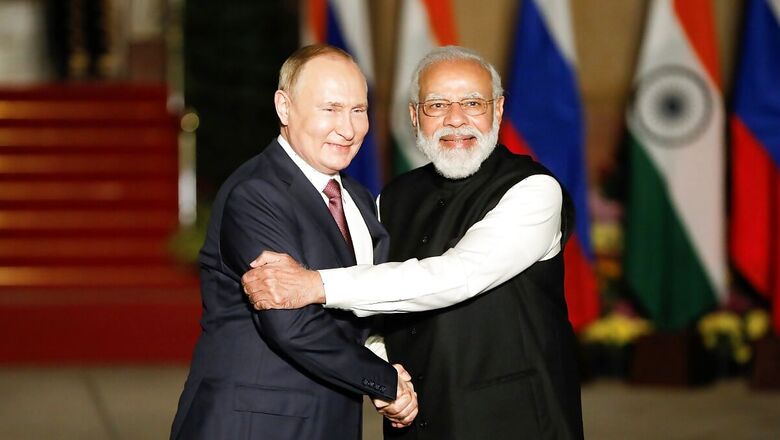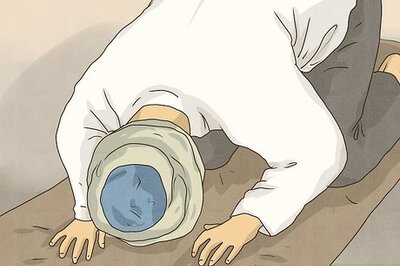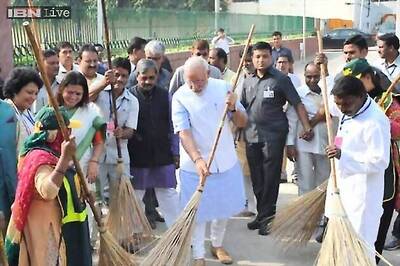
views
It has been more than two years since the war in Ukraine. Russia is dominating the war, while Ukraine keeps up its defences with complete dependence on Western help. Peace remains elusive. But the situation is changing— financing two wars at once has been getting difficult for the US — the Israel-Gaza War and the Russia-Ukraine war is tearing a hole into the USA’s finances, so the West is tacitly pushing for a peace plan. Meanwhile, Putin has been making every possible move to garner leverage and return to the mainstream. Plus, the USA’s mild reaction to Putin visiting Vietnam recently is a potential sign of backdoor outreach to the Russian leader. In the middle of all this, an India-Russia leaders’ summit in Moscow can make a huge difference, given India’s potential to act as a bridge between the two sides.
This will be Modi’s first visit to Russia in five years. The last time he was there was in 2019 for the Eastern Economic Forum in Vladivostok. The tradition of annual summits between India and Russia began in October 2000 during President Vladimir Putin’s visit to India. The two countries have never looked back since. The last annual summit took place in December 2021 when President Putin met PM Modi in New Delhi. Since then it has been Modi’s turn to visit Moscow for the summit, but that had not happened so far. 2021 was a different year — the world was just emerging out of the Covid pandemic and no one knew that Putin’s war on Ukraine was just weeks away. In the wake of Putin’s so-called “special operation” in Ukraine, Prime Minister Modi called for peace and settlement through diplomacy, not war, which is a stand India maintains till this day.
It’s worth noting that in 2014, Modi’s first bilaterals were within the Himalayas with Nepal and Bhutan. After his victory in 2019, his focus shifted to the Indian Ocean with his first bilateral visits to Sri Lanka and the Maldives.
This time around, he is charting a different path. He first called leaders of neighbouring countries including the Maldives, Sri Lanka, Bhutan and Bangladesh to his oath-taking ceremony. He then flew to Italy for the G7 Summit, where he engaged with Western leaders including the USA’s Joe Biden. Then he hosted an American delegation essentially seeking autonomy for Tibet from China. Moreover, Modi will not be attending the SCO summit in Kazakhstan next month — a snub aimed at the China-centric leaning of the grouping. Instead, he will be heading straight to Russia.
This is a signal to the West that India would continue building upon its ties with the West. But naturally, a defining trait of Indian foreign policy is its strong bent on strategic autonomy and that means a continuation of enhanced ties with Russia. In recent years, India has refused to end ties with Russia and join in on the sanctions against it. In fact, during a global oil crisis triggered by Western sanctions on Russian oil, India stepped up its imports of the very same oil from Russia at a discount making it one of India’s biggest oil exporters. Moreover, India continues to cherish its longstanding military ties with Russia which forms the core of their relationship.
This visit is a reaffirmation of strong ties between the two nations. India considers its friendship with Russia a crucial asset especially in the context of tensions with China. Despite ever so close relations with Beijing, Russia seeks to hedge against China and India helps as a counterweight.
Several matters will need to be ironed out when the two leaders meet. Given the top-down approach of the Russian administration, a Modi-Putin summit holds significant potential for accomplishments, making a bilateral meeting particularly worthwhile.
The most pressing issue is that of trade. India-Russia trade volumes have inflated to $65 billion in 2023 with most of it involving Russia’s oil exports. Meanwhile, India’s exports to Russia stand at only about $4 billion and India is not pleased with this trade imbalance. It is this wide trade deficit that New Delhi wants to address by pushing Russia to increase Indian imports. With a large part of oil payments done in the rupee, the two countries are looking for ways in which Russia can put the Indian currency to use— whether it is by increasing Indian imports or investing in the Indian economy.
Moreover, India and Russia are all old defence partners. India has bought the Russian S-400 anti-aircraft missile systems among various other purchases of Russian arms. Russia is now pushing for a logistics pact with India which would allow their navy to use each other’s ports for logistical support. In fact, Russia has published information on this Reciprocal Exchange of Logistics Agreement (RELOS), which was in the pipeline for years, on its legal info website showing that the pact is just a few signatures away. There is much more to gain for Russia here than India at the moment but it adds a strategic advantage for India in view of the increasing importance of Arctic sea routes.
Thirdly, Ukraine will definitely feature at the top of the meeting agenda. It is very obvious that a call for peace in Ukraine will be raised by PM Modi who has long maintained that “this is not an era of war” and differences can be settled through diplomacy and negotiations. PM Modi even met Ukrainian President Zelensky on the sidelines of the G7 Summit. At a recent summit for peace hosted by Switzerland, India declined on signing the joint communique stating that it required a dialogue between all parties, which basically means that the peace negotiations should have involved Russia.
Meanwhile, this is a boost for Putin as well whose foreign trips had been restricted to post-Soviet Central Asian countries and China since the war. His recent trips to North Korea and Vietnam have brought more variety, with Vietnam being the only nation visited by him so far to have balanced ties with the US. Moreover, Russia is hosting the BRICS summit later this year, and it cannot afford to have a no show. Having skipped the BRICS summit in South Africa and the G20 Summit in New Delhi last year, it is crucial for Putin to make a comeback on the world stage.
Modi’s visit lends more legitimacy to Putin’s global stature, and it is certain that Russia will leverage this summit to garner the world’s attention and perhaps take a dig or two at the West. India’s objectives are clear, however. With Russia moving closer to China, India must offer a counterbalance, regardless of its growing ties with the West.



















Comments
0 comment